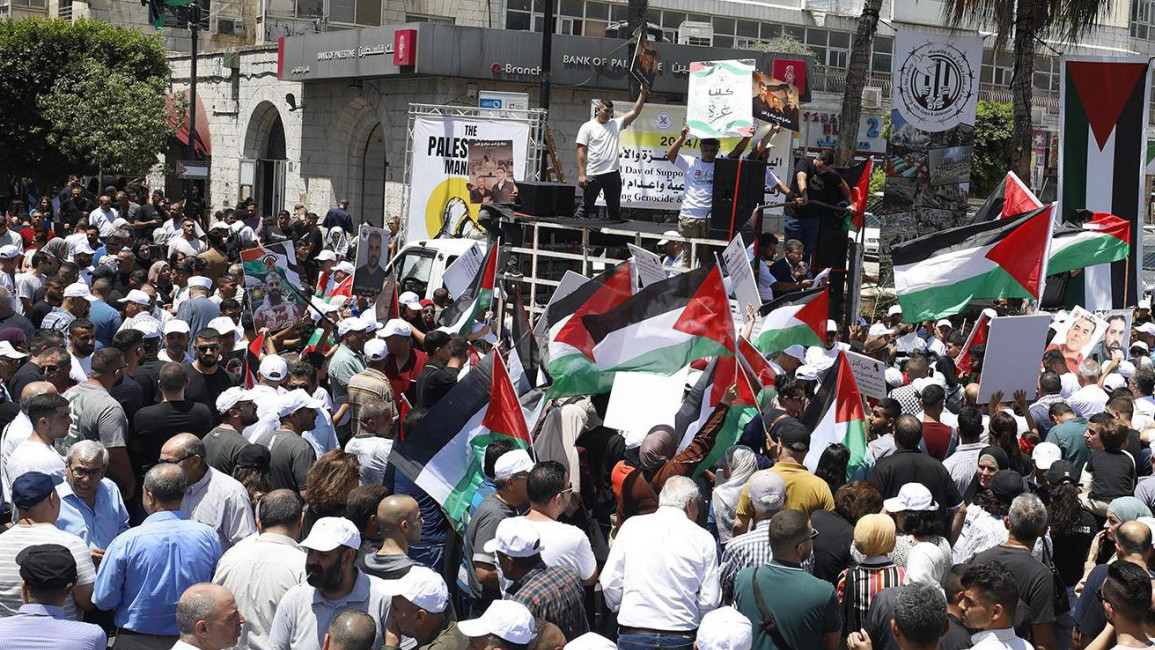West Bank residents torn between grief, hope and distrust after Israel's murder of Ismail Haniyeh
While the region boils with the anticipated escalations on the back of Ismail Haniyeh's assassination, with Iran gearing to respond by striking Israeli targets and Western countries warning citizens from remaining in Lebanon, the politician's murder, who also headed the Palestinian negotiating team for the ceasefire deal, is hoped to bring a much-awaited reconciliation among Palestine's disputing factions.
Following Haniyeh's assassination in Tehran by Israel, protests were held all across the occupied territories, from Ramallah, to Hebron, Jerusalem and elsewhere. During these rallies, organisers forbade the raising of any flags but Palestine's, and participants called him "the man of unity".
Meanwhile, the Palestinian Authority, governed by Fatah which had a years-long feud with Haniyeh's Hamas, declared days of mourning. In a rare gesture, President Mahmoud Abbas called Khaled Meshaal, tipped to be the next Hamas leader, for the first time since 2020 to express condolences. Abbas also urged Palestinians to unite against the "terrorism" which led to Haniyeh's murder.
According to Palestinian journalist Nael Buaital, the implications of Haniyeh's assassination testify to the man's importance. "The West Bank witnessed assassinations of several leaders from various Palestinian factions over time. Residents of the West Bank are used to this. However, these assassinations never triggered any major fears among people of the West Bank the way Haniyeh's assassination did," he noted.
'He united us'
While Gaza has been governed by Hamas since 2007, and many of its residents exhausted by war hold its leaders, including Haniyeh, as key factors behind the grim, war-wrecked state they live in, many in the occupied West Bank long for Hamas' proactive politicians.
Mariam, who asked to be identified by her surname only in fear of being persecuted by Israel for mourning Hanieyeh's death, said the news of his assassination remains one she cannot fathom.
"I read it once, twice, three times, unable to believe it. I thought: 'But he wasn't even in Gaza!' It feels like I've lost someone so close to me. He was our best shot of reaching a ceasefire. He was heard. Hamas is heard. They've made the whole world stop and listen," she said.
The Ramallah-based resident also opined that killing Haniyeh is not a blow to Hamas alone, but to all Palestinians. "He spoke of us, about us. His words united us. He, too, lost his sons. He, too, was displaced. He was one of us," she concluded.
Echoing similar sentiments, Buaital pointed to Haniyeh's legacy as the prime minister of the short-lived national unity government which governed Gaza, the West Bank and Jerusalem in 2006, until Western pressures and sour relations between Hamas and Fatah led to its dismantling in 2007, and Hamas imposing its authority over Gaza since.
"It was brief, but marked an important period for us as Palestinians," he recalled.
This longing for unity, he said, is what makes many in the occupied West Bank hope that the assassination would usher in a new era in which factions put aside differences for the best interest of Palestinians.
Jamil Abu Sada, a retired professor at Birzeit University, echoed the same thoughts. "Haniyeh's assassination is feared to lead to more assassinations as Israel seeks to buy time and keep the war ongoing. It's therefore hoped that politicians realise this, and put their hands together to keep Haniyeh's legacy ongoing as a man for unity and peaceful resistance," he noted.
'It's about time'
But not everyone in the occupied West Bank agrees. As protests were underway with Palestinians denouncing Haniyeh's murder, many were walking past, oblivious to the crowds and their chants.
One man, who asked not to be named, said Haniyeh "is a politician like the rest of them. I don't see why he's being glorified. What has he done to us as Palestinians? He's been abroad since 2017. What have we gained from that?"
Another man, clearly touched by Haniyeh's death, refused to comment, saying, "I don't want to get into trouble from the PA or the Israelis. They both can't stand anyone expressing appreciation to Hamas and Haniyeh."
According to Mohamed Shahin, dean of the Faculty of Graduate Studies at Al-Quds Open University, Haniyeh's assassination is a reminder that "Palestinians' fate should not be pegged to one individual or one person. There must be a unity and a commitment to which all parties sign up in order to end the status quo," he said.
"It's about time factions work out a way to work together and end this stalemate that is costing us so many lives," he added.
He further noted that the assassination is bound to extend the duration of Israel's war on Gaza, which he said Haniyeh's latest negotiation efforts focused on negotiating an end to. "The timing of his murder is yet another proof that Israel has no intention of ending this war. Haniyeh was one politician who worked hard towards a ceasefire. Eliminating him is akin to eliminating the prospects of a ceasefire," he said.
Abu Sada, of Birzeit University, agrees, stating that Haniyeh's political and military power had made him "a world-class negotiator whose authority and edge made him feared by occupation forces. Taking him out is a massive hurdle for Palestinians' efforts to end the war."
Agreeing with the blow Haniyeh's assassination has on the ceasefire talks, assistant undersecretary at the Ministry of Labour Abdulkareem Daragama said the only way this could be in the interest of Palestinians, is if it brings domestic peace.
"There is no doubt Israel wants to kill more, and it will do anything to do that," he noted. "The only way Haniyeh's death could be turned against them is if the reconciliation of factions' leaderships and the unification of the national goal materialises, even if the difference in visions or even political opinion persist. Haniyeh's assassination could bring together the unity he sought," he concluded.
This piece was published in collaboration with Egab.




 Follow the Middle East's top stories in English at The New Arab on Google News
Follow the Middle East's top stories in English at The New Arab on Google News
![People gathered around the rubble of destroyed houses to search for survivors [Getty]](/sites/default/files/styles/image_330x185/public/2024-11/GettyImages-2184733820.jpg?h=199d8c1f&itok=NiM1LO2f)

